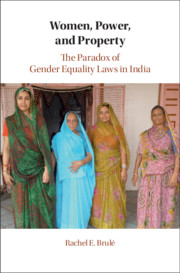Book contents
- Frontmatter
- Dedication
- Contents
- List of Figures
- List of Tables
- Acknowledgements
- 1 Introduction
- 2 A Theory of Political Representation and Economic Agency
- 3 Property and Power: A Political History of the Hindu Joint Family
- 4 Where Are the Women? Investigating Reform’s Roots
- 5 The Politics of Property Rights Enforcement
- 6 The Long Arm of Resistance: Refusal to Care for Parents
- 7 Representation and Violence: Gender Equality and Sex Selection
- 8 Conclusion
- 9 Data Appendix
- Bibliography
- Index
5 - The Politics of Property Rights Enforcement
Published online by Cambridge University Press: 16 October 2020
- Frontmatter
- Dedication
- Contents
- List of Figures
- List of Tables
- Acknowledgements
- 1 Introduction
- 2 A Theory of Political Representation and Economic Agency
- 3 Property and Power: A Political History of the Hindu Joint Family
- 4 Where Are the Women? Investigating Reform’s Roots
- 5 The Politics of Property Rights Enforcement
- 6 The Long Arm of Resistance: Refusal to Care for Parents
- 7 Representation and Violence: Gender Equality and Sex Selection
- 8 Conclusion
- 9 Data Appendix
- Bibliography
- Index
Summary
When do quotas for women’s political representation promote economic gender equality? Legislative reforms equalizing economic rights are common globally, with mixed results. I consider the impact of quotas on women’s rights in a crucial domain: property. I first explain my research method, utilizing more than two years of qualitative research and quantitative data. I leverage exogenously set electoral quotas—reservations—for women as heads of local government in India. Reservations enable clean identification of the impact of representation on enforcing gender-equalizing land inheritance reforms. I find that political representation enables women to secure property rights and ensure that they are upheld. However, backlash occurs when reservations guaranteeing female representation make enforcement of reform credible. Women can reduce this backlash by utilizing female representation to trade traditional monetary dowry for property inheritance and familial responsibilities. This, in turn, reduces the “cost” of reform to men. These findings confirm the power of political representation. However, quotas for female representation will be successful at incentivizing economic gender equality only to the extent they also provide women with resources to pursue enforcement of rights in ways that provide opportunities for integrative bargaining solutions.
- Type
- Chapter
- Information
- Women, Power, and PropertyThe Paradox of Gender Equality Laws in India, pp. 118 - 163Publisher: Cambridge University PressPrint publication year: 2020



